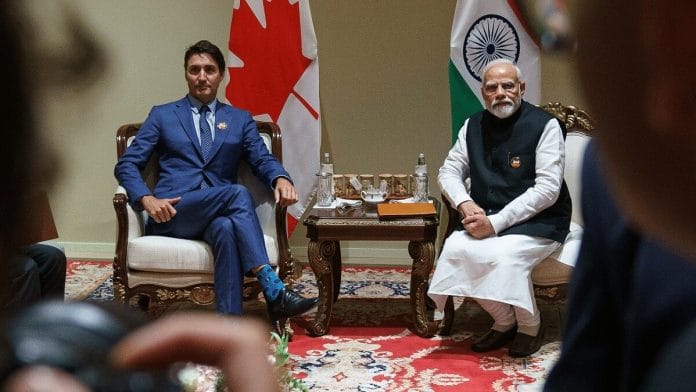Canada has alleged the involvement of Indian agents in the killing of Hardeep Singh Nijjar in British Columbia on 18 June 2023. On an ideological level, Canada likes to project that its liberal values with human rights as its lynchpin have shaped its policies and actions in dealing with Khalistanis after Operation Bluestar in 1984. In reality, what Canadians should be worried about, in the future, is that the Khalistan issue could find realisation in their own country if Canada does not change its policies based on ideological underpinnings that are blinded by absolutist human rights values.
Granting asylum on grounds of human rights violations also allowed the entry of hardliner Sikhs in Canada. The Sikh population doubled in the last two decades and is now 2.1 per cent of Canada’s population. They consist mostly of economic migrants. The present lot of Khalistani supporters in Canada as fringe elements, who are mostly second-generation migrants brainwashed by stories of continued atrocities against the Sikhs in India.
Absolutist human rights values could impact Canada’s own interests and the security of India. Similarly, extremist elements exist in the US, UK, Australia and Germany. Meanwhile, GS Pannun, who has been designated as a terrorist by India and is the head of a Khalistani outfit, Sikhs for Justice (SFJ) in New York that India banned in 2019, said on video “Indo-Hindu leave Canada; go to India. You not only support India but you are also supporting the suppression of speech and expression of pro-Khalistan Sikhs.” All these elements are nurtured and sustained by Pakistan’s ISI, which has played a major role in the radicalisation of the Indian origin youths. In addition, provision of shelter, finance, training, operating bases and weapons to carry out terrorist actions and propaganda in India have also become issues to contend with.
All threats notwithstanding, reaction of the US, Australia and the UK to the accusation levelled against India by Canada reveals that they view the Khalistanis as being part of a cultural and social movement. It is evident that they have chosen to look away from the facts on the ground. For India, it is a secessionist movement that is sustained primarily by Pakistan and the misuse of human rights valued in Western liberal ideology. The zest for Khalistan has not had any worthwhile support in Punjab for over three decades. It survives in different degrees of intensity in isolated pockets of the Indian diaspora. All the same, disaffection among the Sikh diaspora can affect the fragile communal balance in Punjab and elsewhere in India.
India’s reaction at the diplomatic level has been sharp and candid. But one hopes that once the hot winds of emotions fade, the forces of global geopolitics will bring about a return to some normalcy marked by better understanding of India’s security concerns.
Also read: Chinese debating who to support — India or Canada. They don’t even get the Khalistan issue
Weakening of India’s credentials
On another plane, Canada’s allegations should alert India’s polity to introspect about the weakening of India’s credentials in the field of human rights. India’s journey since Independence has been to seek social, economic and political justice and has been guided by the values of freedom, human dignity, equality and fraternity. This path involved the jettisoning of abominable religious and caste practices that sanctioned the oppression of a major segment of the Indian population. It included bonded labour, child labour, people who were not allowed access to water sources and social and cultural activities. Access was denied in the name of the Hindu religion and the caste system. Much of these restrictions no longer exist though they still inhere in several pockets and more importantly thrive in certain cultural practices of India’s social fabric.
India’s human rights record in the recent past has been played up by the US as a matter of concern. Canada’s allegations unfortunately dovetail into such human rights narrative. But we should know that the US and its allies have no moral authority to lecture us on human rights. They have all done incalculably worse things. But that is no reason for us not to introspect on the present trajectory of increasing human rights violations in India augmented by undermining and misusing the institutions meant to uphold the law. Increasingly, rule by law is replacing rule of law.
India’s ascent in power has to be cognizant of the preservation of constitutional values that must guide its course. If we do not do so, India would be no different from many powers that historically became strong and then, arrogant and drunk on the notion that might is right. We must take guidance from the Arthashastra that prescribes different methods for use of force or coercion when dealing with one’s citizens and the those of other states. Our present practices seem to often forget this crucial difference.
Lt Gen (Dr) Prakash Menon (retd) is Director, Strategic Studies Programme, Takshashila Institution; former military adviser, National Security Council Secretariat. He tweets @prakashmenon51. Views are personal.
(Edited by Anurag Chaubey)






